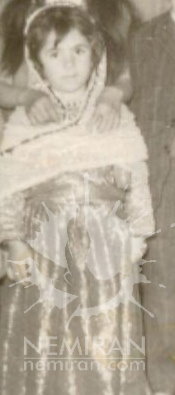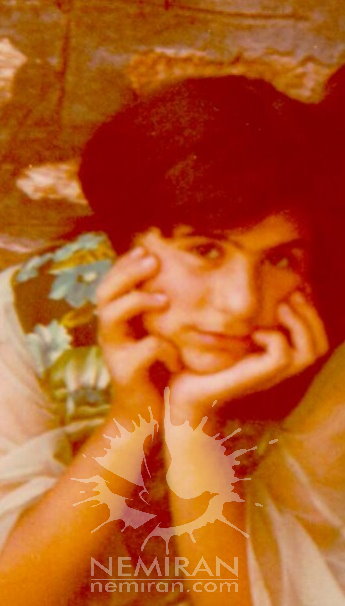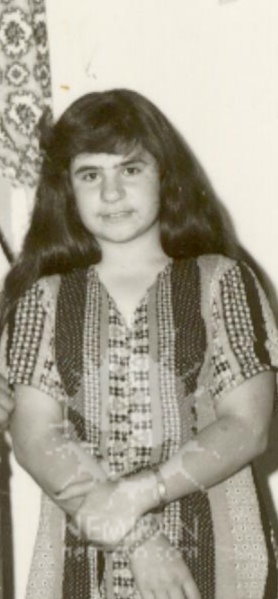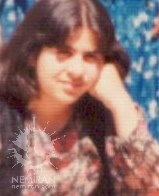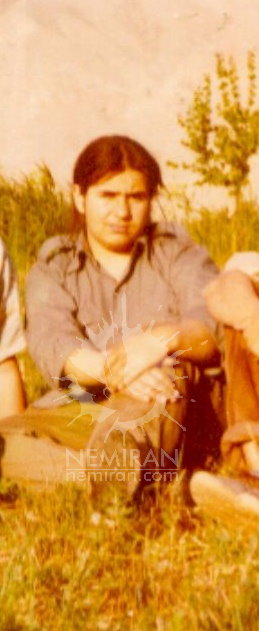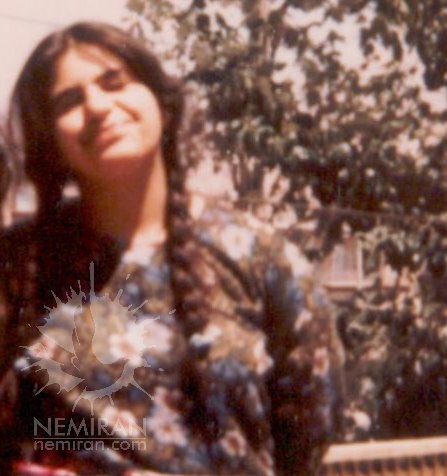Sholeh, daughter of Mohammad Amin Ebrahimi Aichi and Fatemeh Vakili, was born one day of 1344 Iranian Calendar (1965) at 8:00 o’clock pm. She was the ninth and youngest child in the family, that’s the reason why everyone in the family loved her so much. She was very beloved among the family and friends because she was very kind and always cheerful. She completed her primary and secondary education and the first year of high school in Saqez. Among the school subjects, she was very interested in literature and poetry, especially in new poems style, including Shamloo, so that she whispered most of her poems jokingly and seriously at all times. This interest in literature motivated her to occasionally try to write poetry herself. Two of her poems were even published in the Peykar Youth Newspaper. In terms of personality, she was a very kind character with always happy and positive humor. She loved her friends very much and for this reason she had many friends. She paid special attention to those who were not well off financially and she had a generous hand. She was fearless in political activities and enjoyed discussion and was a girl of vast reading. But the main aspect of her personality was her open heart and her kindness, which could not bear the poverty and misery of her fellow human beings. She always tried to help poor people, even by donating onions and potatoes at home without his mother’s knowledge or donating her own new shoes.
She took part in most anti-regime demonstrations and was imprisoned three times for her activities. Sholeh was arrested in 1360 (1981) for the first time along with some others during a demonstration against the regime’s crimes, and she was imprisoned overnight. The girl was identified by a guard named Morteza Sharifipour, who was already at school with several other guards, on 02.11.1360 (22.01.1982) while she was singing the Kurdish national anthem. Sholeh and several others were arrested and spent a week in the Saqez Revolutionary Guards prison. They pledged her to stop participating in demonstrations and activities and she was released. Sholeh’s mother decided to send her to Tabriz to continue her education because she was very worried about the future of her daughter and was aware of Sholeh’s spirit and knew that her interest in helping others could not be suppressed.
This spatial distance had no effect on her. The love for the people and the liberation of human beings from the shackles of ignorance motivated her to continue to maintain a long-distance relationship with her fellow thinkers and friends. Unfortunately, in fall of 1361 (1982), several of her comrades were arrested. Under the pressure of the brutal tortures of the Revolutionary Guards, they were forced to expose and name their comrades. Nezam Hasani, member of Peykar Organization, Mohammad Saleh Sohrabi and Sholeh, sympathetics of Peykar Organization, were among them. Unfortunately, all three were executed. Sholeh was imprisoned in the city of Tabriz. She spent a month in solitary confinement in Tabriz prison. The Tabriz Corps stated that the plaintiff was in Saqez and she was sent to Saqez.
In Saqez, Sholeh spent three months in solitary confinement, during that time she was subjected to various forms of physical and mental torture. She spent a total of 14 months in prison. During this time, her family visited her several times. I also participated in these meetings. During our first visit, I secretly asked her if she had been tortured. She showed her handcuffs that were crooked and she said that Hassan Batool had put pressure on her hand with his boots and had told her if she now cannot write slogans anymore. She also said that she had been beaten. Once again, a family member went to the prison to get her news. He was led to prison. This member heard screams and shouts and after a while they brought Sholeh in the room. She was crying. Seeing her family, she shouted: “why don’t you tell them that I do not know anyone. They must stop to torture me.” One of the types of psychological torture was taking her for a staged execution after 12 o’clock at night. She even wrote a will that night. Her fellow inmates have acknowledged this. They even put her mother under pressure. For example, she was told to ask Sholeh to reveal the names of her comrades; otherwise they would execute her in front of her mother’s eyes. During the last meeting on Friday 21.05.1362 (12.08.1982), my mother heard that some Revolutionary Guards and a religious prosecutor had come from Tehran. I was living in secret at that time. That night I went to a friend’s house near the Revolutionary Guards headquarters. My mother, who had not seen me for some time, came to see me. As usual, we slept close at night, and since we had not seen each other for some time, we liked to talk. We heard the sound of numerously shots and then 17 single shots at one o’clock in the morning. I counted the shots and subconsciously knew it must have been the execution. In the morning, my mother woke up upset because she had dreamed of Sholeh. She had dreamed that a revolution had broken out and the doors of prison had broken, but Sholeh did not come out. My mother went to the prison to get her news. There, she got the information from two kurdish mercaneries, Atta Askar and Javanmardi, had executed 17 persons, six girls and a eleven boys. They had been executed after the judgment of that prosecutor. In this way, at the age of 17, Sholeh left this world by the most barbaric regime in the world. She left the path of saving human beings from ignorance, superstition and oppression for her fellow human beings. Those who were directly involved in this cowardly and inhuman tragedy were the religious prosecutor from Tehran named Mazaheri, the head of the Revolutionary Guards named Hassan Batool and three torturers named Morteza Sharifipour, Jamshid and Mehdi.
The Revolutionary Guards refused to hand out the bodies of those 17 people to their families because they did not want to leave a trace of their crimes.
Coincidentally, we got the information from a doctor who worked in Saqez that the Revolutionary Guards had taken the bodies to hospital that night. He heard that they want to send the bodies to the Cemetery in the city of Qorveh “Laanat Abad” which means “cursed place”. The same day, my mother went to Qorveh with two or three people. She excavated some new graves with her own hands in the evening and detected Sholeh’s watch and shirt. She lost consciousness. We informed other families where their loved ones had been buried.
It should be noted that we and other families have rebuilt tombstones on the graves of our loved ones several times, each time they broke the stones to cover the track of the graves. After Sholeh’s death, her parents were threatened and harassed for many years.
I mention here a few points that are human rights violations in all systems of government in the world:
1 – Where in the world is a person sentenced to death for reading newspapers and magazines and participating in demonstrations?
2 – Sholeh and the other five girls and most of the eleven boys who were executed were under the age of eighteen, meaning they had not reached the adult age.
3 – She was imprisoned for fourteen months and in solitary confinement for four months. Where in the world is a 16-year-old girl kept in solitary confinement for four months?
4 – The bodies of Sholeh and 16 others persons were not handed over to their families.
5 – A death warrant was never issued to at least reassure families of what had happened to their children.
6 – Sholeh’s name was removed from my parents’ birth certificate.
Here you have to ask this regime why it was so afraid of Sholeh.
Long live the dear memory of Sholeh and all the fighters for freedom who wanted to save humanity from the system of ignorance and oppression.

